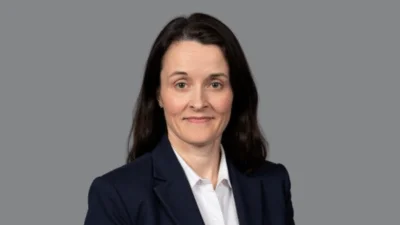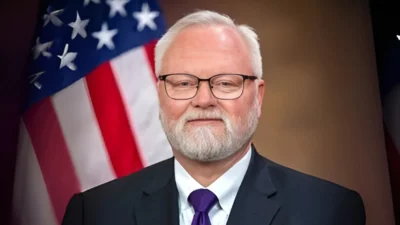Deb Fischer | Wikipedia
Deb Fischer | Wikipedia
WASHINGTON, D.C. – U.S. Senator Deb Fischer (R-Neb.), a member of the Senate Appropriations Committee, on May 03 2023, questioned U.S. Environmental Protection Agency (EPA) Administrator Michael S. Regan about the need to expand access to E15 and a potential rule from the EPA to require unnecessary reporting of air emissions from animal waste.
Click the image above to watch video of Sen. Fischer’s questioning Click here for audio
Following is a transcript of Senator Fischer’s questioning:
Senator Fischer: Thank you, Mr. Chairman. Administrator Regan, I was glad to see that the EPA issued an emergency fuel waiver last week to allow E15 to be sold this summer. Providing access to E15 helps families save money at the gas pump. It's better for our environment, and it boosts our nation's energy security. While the emergency fuel waiver is a good thing, I believe we need a permanent fix. And I have a bipartisan bill for that, the Consumer and Fuel Retailer Choice Act. It ensures nationwide, permanent access to E15. Mr. Administrator, will you commit to working with me to get this bill out there and hopefully enacted so that we can ensure that we have that E15 for consumers in future years?
Administrator Regan: The President has pledged that biofuels, especially advanced biofuels, would play a part in this economy as we move forward. So, I look forward to partnering with you and your staff with technical assistance to be sure that we can make E15 more accessible.
Senator Fischer: Great. We look forward to working with you on that. Thank you, sir. I'd like to also discuss a proposed rule on reporting requirements for emissions from animal waste under EPCRA. In 2019, when EPA proposed the current exemption for animal waste air emissions, the national association that represents state Emergency Response Commissions, the tribal Emergency Response Commissions, and Local Emergency Planning Committees was supportive of this narrow exemption. In a letter to EPA in 2017, they stated about the EPCRA emergency release reports for animal waste emissions, "These reports are of no particular value to LEPCs and first responders, and they are generally ignored because they do not relate to any particular event." EPA has requested an additional $8.4 million for state and local prevention and preparedness under your EPCRA authorities. Do you believe that that is a good use for EPA resources to require reporting of animal air waste emissions or — to put it more frankly — manure smells that local emergency planning commissions have stated are of "no particular value?"
Administrator Regan: I would say that we're responding to a couple of things. The first is we've had some of our states request that we take another look because technology has evolved, access to data has evolved. A number of communities on the ground have requested this. So, this isn't a rulemaking. This is our desire to reevaluate, sort of, how this plays into the broader decision making at the state and federal level.
Senator Fischer: Have you reached out to all states, to the Department of Environmental Quality, for example, have you reached out to all states on that? Or, are you basically hearing, just from the states that want to have a new look at it?
Administrator Regan: Let me circle back and see if we've heard from all 50 states on this and how we've been communicating with all of our states on this. Revisiting this, I can follow up with you on that.
Senator Fischer: Okay, that would be great because I know there are probably just as many states that would take an opposite view on it. And, as you said earlier to one of the questions that my colleagues had asked, it's important to follow the science on it and make sure that we are promoting fact-based policies that have a tremendous impact on each individual state, depending on their situations. The Bipartisan Infrastructure Law, which I supported, it made historic investments in water infrastructure and, in many cases, targeted those resources towards disadvantaged communities. The law continued to defer to states on how to define "disadvantaged community" for many programs, including those State Revolving Funds. This flexibility to tailor resources towards an individual states' needs, I believe, is definitely a benefit, and it's not a flaw of the State Revolving Funds. I've heard both concerns and also a lot of confusion on how EPA is overseeing these programs, or how you might oversee them in the future. I think some of the confusion — it's grown because of various memos that have been put out and guidance from the EPA and from administrative executive orders. For example, Justice40 Initiative, created by the Administration, states a goal of providing 40% of the benefits of federal investment towards disadvantaged communities. Can you tell me just how the Justice40 Initiative squares with explicit statutory considerations such as in distributing the State Revolving Funds? For example, does EPA have their own disadvantaged community definition? Do you require 40% of the state's project to meet that definition, if you do have that?
Administrator Regan: So, I can answer it in terms of the way you framed it with the State Revolving Loan Fund. You know, by law, 49% of those resources go to disadvantaged communities. And I think, we were quick out of the gate to partner with our states. I'm a former state regulator, so I understand the importance of that. And listen, there were people that had doubts. But I can say that working with Senator Capito, West Virginia and some of our southern states were the first to revamp their definition of disadvantaged communities, so that we could get this money out the door much quicker than needed. And so, I believe that Justice40 is perfectly aligned with the traditional construct of this program. And I was very pleased, in the first year of the Bipartisan Infrastructure Law, that many of our states brought their definitions up to speed. These definitions look different in different states because of different makeup and lots of other issues. But, I believe that our states have a critical role to play. And the last thing I'll say is that's true with this budget request. 85% of the increase in our budget goes to states and Tribes. Our states are very strong partners with this agency, and I'm very proud of that.
Senator Fischer: Thank you very much. Thank you, Mr. Chairman.
Original source can be found here.




 Alerts Sign-up
Alerts Sign-up